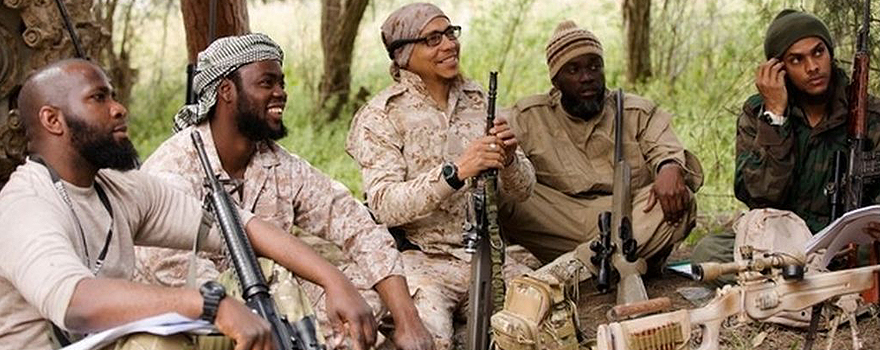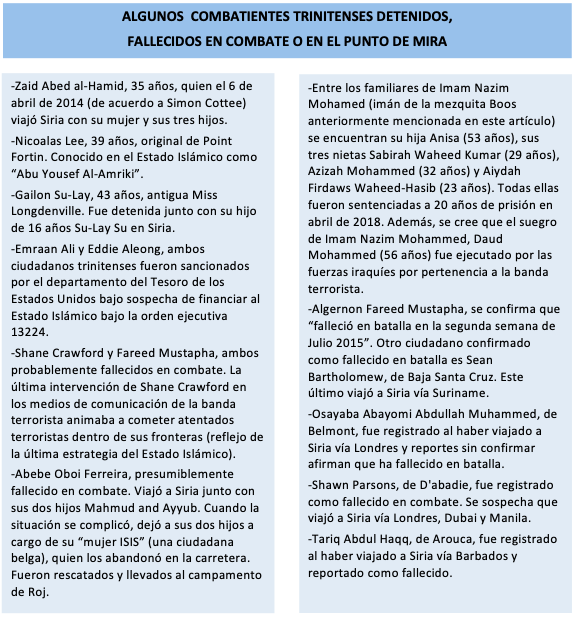The Caribbean country, with only 2 million inhabitants and barely 100,000 Muslims, sent proportionally the most fighters to Syria: a total of 130 fighters.
-
Authorities in Trinidad and Tobago arrested four suspected jihadists on Feb. 8, 2018 for planning an attack on Carnival in Port of Spain
-
The U.S. Treasury department sanctioned two Trinidadian nationals in September for participating in Islamic State financing activities.
-
The insular government developed a new counterterrorism strategy in 2018, urged by White House fears of easy export of extremists to the U.S.

▲ T&T jihadists in Syria, in an image released by ISIS's Dabiq magazine.
report SRA 2019 / Ignacio Yárnoz[PDF Version] [PDF Version].
APRIL 2019-Amid Western concern over the unleashing of jihadists that the pacification of Syria is bringing, where radicalized elements from many other countries went to fight, the United States is taking a hard look at a small neighbor. On February 8, 2018, four men were arrested in Mohammedville on suspicion of planning to commit a terrorist act. The place where the alleged attack was to happen may come as a surprise: the Caribbean carnival in the city of Port of Spain. Indeed, we are talking about a Caribbean nation that is also a victim - and exporter - of the globalized phenomenon of jihadist terrorism: Trinidad and Tobago. In recent years, Trinidad and Tobago has set off alarm bells among Western analysts, especially in the United States because of its geographic proximity to these islands and the possibility that this phenomenon could destabilize its backyard, the Caribbean.
The phenomenon of Islamist radicalism in Trinidad and Tobago is not new, considering that in 1990 there were already radical groups such as Jamaat Al Muslimeen, which even attempted to overthrow the government through a coup d'état. In addition, there were also known terrorists from this country such as Kareem Ibrahim, who in 2012 was sentenced to life imprisonment in the United States for planning an attack at JFK International Airport in New York.
However, the terrorist phenomenon on the island escalated in 2014 and 2015 with the rise of the self-proclaimed Islamic State (al-Dawla al-Islamiya al-Iraq al-Sham, or Daesh for its acronym in Arabic). This small Caribbean country contributed at least 130 fighters to the jihadist cause, from agreement with its own authorities, according to data also endorsed by the yearbook anti-terrorist department of the US State Department. This makes Trinidad and Tobago the country that proportionally sent proportionally more fighters to Syria to join the Islamic State (the Trinidadian Muslim community is only 104,000 faithful, 5% of a population that can reach 2 million inhabitants, although the official census is 1.3 million). Although it is estimated that some 300 fighters joined ISIS from the USA and Canada, the per capita figure is higher in the case of Trinidad and Tobago, a country which in absolute numbers also contributed more jihadists than other Latin American and Caribbean nations.
According to a research by Simon Cottee, Professor of Criminology at the University of Kent. Of these 130 Trinidadians, 34% were male, 23% female, 9% teenagers and the remaining 34% under the age of 13. This indicates that it was not just young people, but entire families who traveled to the Islamic State.
Reaction and surveillance
These data alarmed the Government of Port of Spain as well as that of Washington and other neighboring nations. The very fact that Trinidad and Tobago had no law prohibiting travel to the "Caliphate" to join the holy war was considered by the United States as a threat to its own security, considering that a Trinidadian citizen could cross the entire Caribbean without a visa to the Bahamas and be only a hop, skip and a jump away from Florida.
Within a month of becoming U.S. president, Donald Trump reached out in February 2017 to Trinidad and Tobago Prime Minister Keith Rowley, with whom he met at the White House. Rowley committed to greater measures to combat the threat posed by the departure of so many Trinidadians to jihad.
First, an amendment to the Anti-Terrorism Act was passed unanimously to improve the legal tools to detect, prevent and prosecute terrorism and its sources in Trinidad and Tobago. The measures also included a procedure called assessment, Comparison and Identification System staff (staff Identification Secure Comparison and Evaluation System, PISCES), agreed with the US and implemented at entrance posts in Trinidad and Tobago. Added to legislative action, in November 2017, the Trinidadian National Security committee approved a comprehensive counter-terrorism strategy aimed at stopping those who support terrorism or glorify it. This strategy encourages close partnership between UK, Israeli and US intelligence agencies for information sharing.
As a fruit of that determined action and of the special partnership with Washington, in September 2018, the US Treasurydepartment placed sanctions on two Trinidadian nationals on the grounds that they were involved in procuring funding for the "Caliphate". In addition, the national authorities are vigilant about the return of fighters. The Supreme Court has authorized repatriating and taking custody of some minors.
Many of the fighters have died in battle and the few who have wanted to return have been arrested or placed under surveillance, but the threat is still latent. Also because with their return they can encourage a new radicalization of Trinidadian citizens who, given the impossibility of traveling to Syria due to the current status debacle of the Islamic State, decide to act within their borders or in neighboring countries. It should be noted that this has been the strategy of the Islamic State during the last few years, encouraging its followers in the West to commit "low cost" attacks with vehicles or with a knife.
Recruitment
What makes the status of Trinidad and Tobago an exceptional status is that there has not been a clear patron saint of recruitment, but rather in recent years there have been several different situations.
On page 64 of No. 15 of Dabiq, the propaganda magazine of the Islamic State, there was an extensive interview with a fighter of the "Caliphate" named Abu Sa'ad at-Trinidadi. This soldier of the "Caliphate", whose real name is Shane Crawford, was one of the first soldiers from Trinidad and Tobago to come to Daesh's call. It is curious that Dabiq dedicated several pages to him, but the fact is that the Trinidadian fighters were a valuable treasure for this organization, for two reasons:
-First, by speaking English, which improved the organization's outreach radius. As former U.S. Ambassador to Trinidad and Tobago John L. Estrada told the New York Times, "Trinidadians do very well in ISIS. They are very high up in their ranks, they are well respected, and they speak English."
-Secondly, they are an attraction for young Caribbean people who are disenchanted with society, regardless of their religion.
As much as Dabiq magazine insists on the testimony of Sa'ad at-Trinidadi - a young man supposedly disenchanted with the Christian religion, who discovered in Islam the true answer to his questions - religion was not in fact the fundamental motive that led the young Trinidadians to join the "Caliphate". As Simon Cottee points out in the research cited above, most of the 130 enlisted Trinidadians had been born into Muslim families of class average Indo-Eastern origin.
The motives that may have affected the young men recruited in Trinidad and Tobago probably had more to do with the sociological need to belong to a group or gang. As Dylan Kerrigan of the University of the West Indiesresearcher told the British newspaper The Guardian, "A gang provides a family, male role models, a social order, and promises access to what many young men think they want: money, power, women, respect. One imam told me that, rather than joining a local gang, some see the trip to the Middle East as joining another gang." Likewise, joining Daesh provided a means of escape for those facing judicial charges. In fact, the idealized Sa'ad at-Trinidadi (Shane Crawford) had already been arrested several times by the authorities and the two companions with whom he traveled to Syria had spent time in jail.
Young people in Trinidad and Tobago could have been radicalized through their visits to local mosques, not forgetting that, as elsewhere in the world, radicalization could also have occurred through online propaganda, the "Cybercaliphate". As for possible agents of radicalization in the first place is who Sa'ad at-Trinidadi mentions as his mentor, Shaykh Ashmead Choate. This man was the head of the conspiracy that in 2011 planned the assassination of the prime minister and other authorities and was ultimately written request foiled. Ashmead Choate studied natural sciences in his native country, but later studied hadith (the behaviors stemming from Muhammad's teachings; they are one of the fundamental pillars of the Sunna) at the Islamic University of Medina in Saudi Arabia. It is estimated that he left the country in 2013 to join the ranks of Daesh, as Sa'ad at-Trinidadi mentions in his interview, "He made the hegira to the Islamic State and found martyrdom fighting in Ramadi." The reasons for his radicalization are not known, but they could be related to his trip to Saudi Arabia, where he might have been attracted by a more Salafist version of Islam.
Similarly, there are indications pointing in other directions. One of the names that surface is that of Yasin Abu Bakr, former leader of the group Jamaat Al Muslimeen, who, having been the precursor of violence in the 1990s and the author of the coup, may have indirectly created a model to follow, although today he does not broadcast a clear call for violence. Likewise, the Boos mosque in Rio Claro, south of Trinidad, run by Imam Nazim Mohammed, was a stopover for many of those who later went on to fight in the ranks of ISIS, such as Shane Crawford and Fareed Mustapha. In an interview with Al Jazeera, the imam himself denied being a precursor of the Daesh cause, although fifteen members of his family have emigrated to Syria and several witnesses to his sermons state that he has on occasion praised the Islamic State.
Also to be taken into account is Abdullah Al-Faisal, originally from Jamaica, who via the internet and social networks had engaged in Islamic State propaganda through Facebook groups and blogs such as Authentic Tauheed, where he distributed propaganda and posted videos of his sermons. His activity is suspected to have ranged from contact with Jesse Morton, an American citizen who worked with Zachary Chesser for apply for the murder of the South Park television show editors to the radicalization of Germaine Lindsay, one of the four Britons who perpetrated the July 7, 2007 London subway bombing. In September 2014, Faisal joined Mohammed Mizanur Rahman and other Islamist propagandists on an online platform where they urged their followers to join the ranks of ISIS. The U.S. government has linked Faisal to other terrorists such as Umar Farouk Abdulmutallab and suspects that he may also have been one of the instigators of radicalization in Trinidad and Tobago.
|

List compiled from the US Treasury's department sanctions and information from the British newspaper The Guardian and newspapers in Trinidad and Tobago.
|
